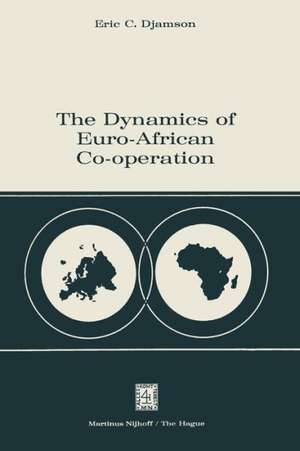The Dynamics of Euro-African Co-operation: Being an Analysis and Exposition of Institutional, Legal and Socio-Economic Aspects of Association / Co-operation with the European Economic Community
Autor Eric C. Djamsonen Limba Engleză Paperback – 1976
Preț: 392.75 lei
Nou
Puncte Express: 589
Preț estimativ în valută:
75.16€ • 77.65$ • 62.55£
75.16€ • 77.65$ • 62.55£
Carte tipărită la comandă
Livrare economică 26 martie-09 aprilie
Preluare comenzi: 021 569.72.76
Specificații
ISBN-13: 9789401503709
ISBN-10: 9401503702
Pagini: 396
Ilustrații: XXIV, 370 p. 2 illus.
Dimensiuni: 152 x 229 x 21 mm
Greutate: 0.53 kg
Ediția:Softcover reprint of the original 1st ed. 1976
Editura: SPRINGER NETHERLANDS
Colecția Springer
Locul publicării:Dordrecht, Netherlands
ISBN-10: 9401503702
Pagini: 396
Ilustrații: XXIV, 370 p. 2 illus.
Dimensiuni: 152 x 229 x 21 mm
Greutate: 0.53 kg
Ediția:Softcover reprint of the original 1st ed. 1976
Editura: SPRINGER NETHERLANDS
Colecția Springer
Locul publicării:Dordrecht, Netherlands
Public țintă
ResearchCuprins
I. The European Economic Community, the Associates and “Associables”: Historical Background and Developments.- The Concept of Association 1.1.- The Content of the Convention of Association 1.11.- The Enlarged Community and Its Repercussions 1.24.- II. Institutional Provisions.- Comparative Analysis of Institutional Provisions of the Yaounde Conventions 2.1.- Powers and Functions of the Association Council 2.7.- The Association Committee 2.20.- Parliamentary Conference 2.21.- Members of the Parliamentary Conference 2.22.- Functions and Powers of the Parliamentary Conference 2.23.- III. A Historical Study of Certain Provisions of the Yaounde II Convention as a Basis for Interpretation of the ACP-Eec Convention of Lomé.- Legal Basis of Association 3.2.- Is There an “Association Law”? 3.10.- Does the Association Have International Status? 3.13.- On the Question of Sovereignty 3.37.- Some Jurisdictional Issues 3.42.- Miscellaneous Private International Law Questions 3.43.- On the Choice of Law 3.44.- The Law Governing Contracts of Employment of Association Servants 3.45.- The Attitude of Municipal Courts to Questions of Jurisdictional Immunity 3.46.- The Association and Immovable Property 3.47.- The Proper Law of Association Contracts 3.48.- Legal Questions relating to Proceedings in Municipal Courts 3.49.- Venue 3.50.- Application of Adjective Law by Municipal Courts 3.51.- Security for Costs 3.52.- Discovery of Documents and Interrogatories 3.53.- Execution of Judgments 3.54.- Voting Procedures 3.55.- The General Principles of Law Recognised by “Civilised Nations” and the Evolution of “Association Law” 3.56.- The General Principles of Law in African Customary Law and Other Systems 3.74.- Conclusions — I 3.98.- Conclusions — II 3.100.- Conclusions —III 3.101.- The General Principles of Law recognised by Member States and Associated States? 3.102.- IV. Political and Economic Considerations and their Legal Effects.- General Observations 4.1.- Africa and the National Territorial State 4.3.- Berlin Conferences (1884–85) compared with the Brussels Conferences (1973–75) 4.8.- Reflections on the Negotiations between the Enlarged EEC and African, Caribbean and Pacific (ACP) States 4.16.- Financial and Technical Co-operation 4.16.- Trade 4.21.- Stabilization of Export Earnings 4.23.- Agriculture 4.24.- Future Perspectives 4.27.- Reciprocity or Reverse Preferences 4.29.- Industrial Co-operation 4.32.- Banking and Related Problems 4.35.- European Investment Bank Loans to Associated States 4.39.- The Association and the International Monetary Fund 4.44.- Problems of Exchange Control 4.45.- Conclusions 4.47.- V. The ACP-EEC Convention of Lome.- General Observations 5.1.- Title I-Trade 5.2.- Title II-Export Earnings from Commodities 5.3.- Title III-Industrial Co-operation 5.4.- Title IV-Financial and Technical Co-operation 5.5.- Title V-Provisions relating to Establishment, Services, Payments and Capital Movements 5.6.- Title VI-Institutions 5.7.- Title VII-General and Final Provisions 5.8.- VI. General Conclusions 6.1.- Appendix: Synoptic Information on the ACP States which Negotiated the ACP-EEC Convention of Lome with the Enlarged European Economic Community.- African States.- Caribbean States.- Pacific States.- Selected Bibliography.- Index of Cases.
















